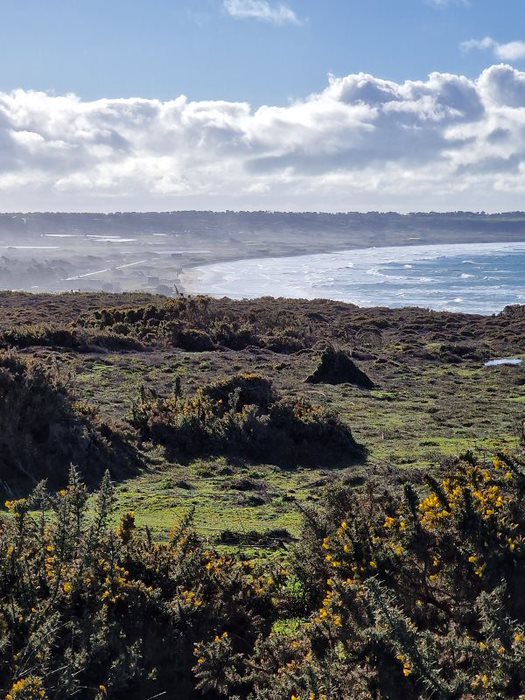Walk & Talk - Benefits of Being Outside
- Sue Ashford

- Mar 10, 2024
- 4 min read
71 of Eco psychology
Eco psychology is the term used for the mental health benefits of being in nature. The term was first used by Theodore Roszack who in his book, Voice of the Earth said our minds are impacted by the
modern world but originate in nature. If we disconnect from nature then we as humans suffer.
The sad truth is that a UK All Party-Commission on Physical Activity found that today's children are the 'least active generation in history'. The World Health Organisation (WHO) cites lack of physical activity as being the fourth leading risk factor for global mortality.
WHO reports that in 2022 1 in 8 people in the world were living with obesity - and that number is increasing. WHO also report that more than 300 million people, 1.9 million children age 3 - 17 have depression. The covid-19 pandemic increased the prevalence of depressive disorders by almost 28% and we are unsure of how many individuals are suffering from anxiety disorders they have not sought help for and not included in statistics. Increasing evidence and research has shown that while, in many cases, psychological and drug treatments are available, exercise is also effective. Continued research is trying to define what type and to what intensity and frequency works best and in what format - individual or group.
I was lucky enough to grow up on a farm. As a child I could run free and explore the countryside with curiosity and little fear. I did not have any thought of environmental dangers over and beyond my Dad's typical farmer's moan about general weather conditions (which were a far cry from the global warming climate crisis we are now living through), the summers were long and glorious and full of adventure. However, within a few decades the way children grow up and experience and understand nature has changed dramatically.
My Mum's cure for every childhood ailment was to go outside and get some fresh air! This was not a modern remedy that she invented - back as far as 1st Century AD the Roman philosopher Seneca wrote that "We ought to take outdoor walks, to refresh and raise the spirits by deep breathing in the open air"

Increasingly exercise is being prescribed by primary care clinicians for adults with mild or moderate depression. The benefits of exercise can also be seen for chronic conditions such as type 2 diabetes, overweight and obesity and cognitive impairment. However, physical exercise can be challenging for people with depression as frequently symptoms of fatigue, low energy and lack of motivation can prevent any activity and consequently make the condition worse.
Environmental psychology has provided evidence that demonstrates that part of the sensory engagement we experience in our relationship with nature seems to be an innate restorative response to the the natural variety of stimulus we encounter.
Our evolution has made us naturally equipped to survive in nature and we are naturally predisposed to focus on natural living processes. This restores our brain functioning and physiology , making us ready for effective responses to to environmental demands. It is increasingly being shown that the natural environment can help towards self regulation in relation to traumatic experiences and bring a new way of being able to cope with our anxieties. Even just being shown pictures of natural settings and listening to sounds of nature has been proven to reduce heart rates, lower blood pressure and increase cognitive ability.
Friedrich Nietzsche said that "All truly great thoughts are conceived while walking".
I love walking and can truthfully say that I have not only had some of my best ideas while walking but have also thought through and resolved many problems while out wandering. The two pictures are from a recent walk where the larger view is truly inspirational and the other reminds you of the fine ecological balance with the wildlife living and trying to survive in the undergrowth.
Walking Therapy is evidenced to be very beneficial for some individuals. Going outside can offer an increased sense of immediacy and vitality - or it can offer a greater sense of calm. It offers a more physically active therapeutic experience where you are prompted to be open to new experiences and allow yourself to address self-limiting processes. I am Walk and Talk Therapy trained and cannot emphasise enough how good you can feel by by coming offline or out of the therapy room to go for a Walk and Talk session with your coach or therapist. When my mum used to tell us to go outside and blow away the cobwebs, I am not sure she knew the physiological reasons as to why it would work - but it usually did!
You will be perfectly safe as I fully assess every client on any physical or mental disabilities that may cause challenges or constraints before any area or route is determined. You may find that you feel like talking more or you wish to talk less as you process your own thoughts as they come to you in this completely different environment
Elizabeth von Arnim wrote "Walking is the perfect way of moving if you want to see into the life of things. It is the one way of freedom. If you go to a place on anything but your own two feet, you are taken there too fast, and miss a thousand delicate joys that were waiting for you by the wayside"
Contact me for further information - it could change your whole life!









Comments